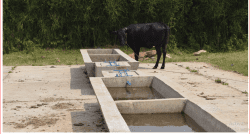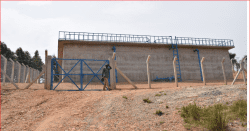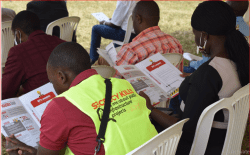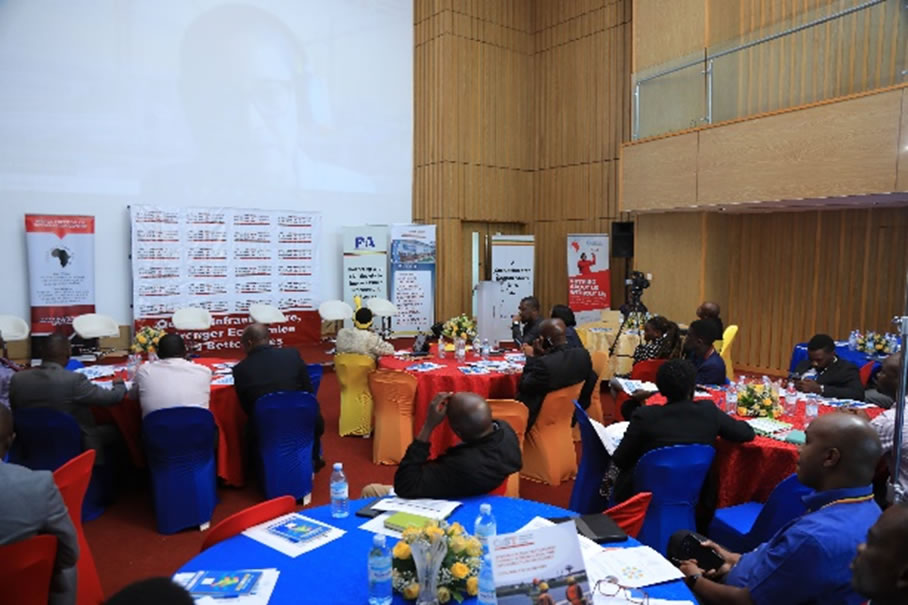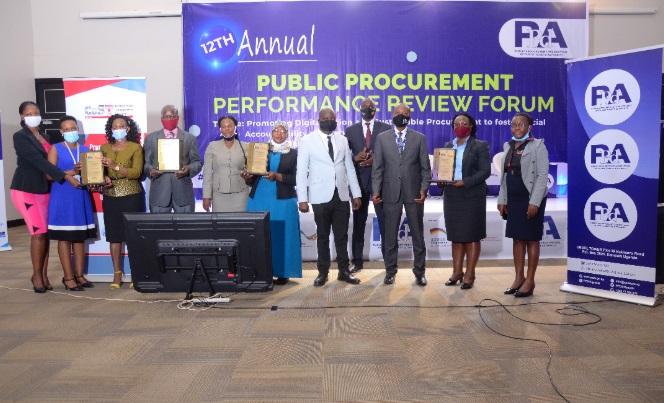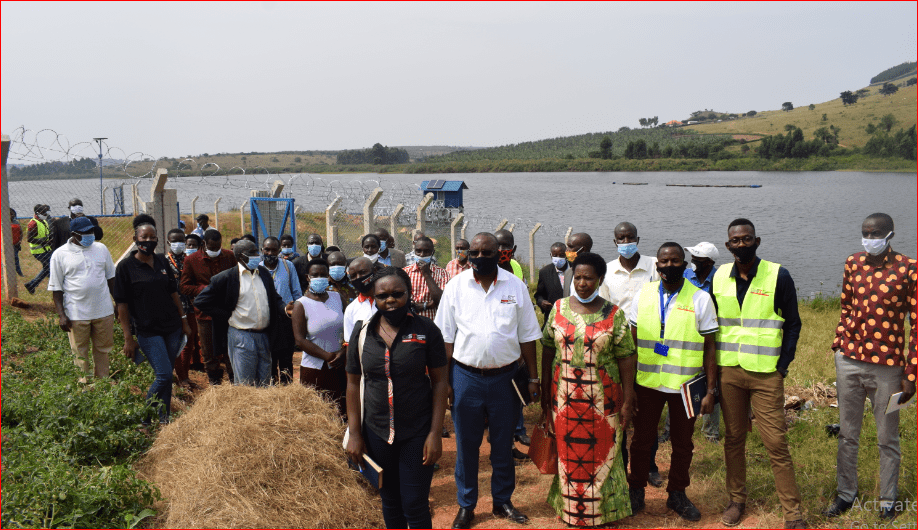
Citizens around Mabira Dam and Nyamihanga celebrate their increased yields and livelihoods resulting from the increased access to water for production. The construction of the Mabira Dam and the Nyamihanga solar-powered small-scale irrigation scheme by the Ministry of Water and Environment – Western Region office has enhanced the standard of lives for the local citizens in Mbarara and Rukiga districts.
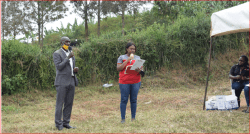
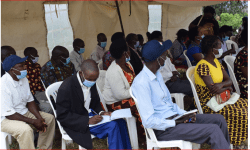
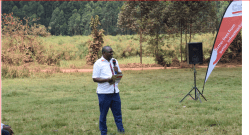
Left _Right, MWE Team responds to the assurance report- as CoST MSG presents the assurance findings and recommendations to the stakeholders.
These projects were subjected to CoST Uganda’s 3rd Assurance process revealing a high level of reactive disclosure and a growing trend of stakeholder engagement. The Assurance process that ran from February 2019 through January 2020, was conducted on 13 projects from the health, education, water, roads, and buildings sectors. The Government institutions involved included; PPDA who recommended the 13 projects, Ministry of Health, Ministry of Education and Sports, Ministry of Energy and Mineral Development, Ministry of Water and Environment, and UNRA. The report generally revealed that 42% of the reactive data was accessed from Ministries of Water and Environment and Ministry of Health. UNRA and Ministry of Energy declined to reactively disclose project information despite various engagements, whereas, Ministry of Education and Sports only submitted their data long after the deadline for data submission.
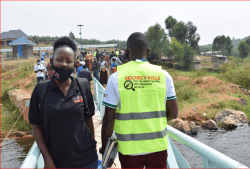
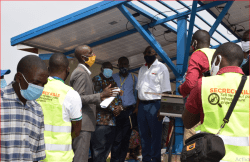
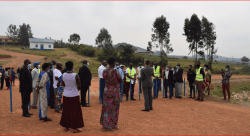
Above_Images from the Mabira Dam Baraza- a cross-section of stakeholders at the site.
Although there was progressive stakeholder engagement in the implementation of the Assured projects by Ministry of Water and Environment and Ministry of Health, findings revealed that for most of the projects, there was a low level of citizen and other stakeholder engagements, where they are engaged, citizens still demanded continuous and timely engagements with the correct project and contract information. There was a lack of ownership of projects amongst the public and projects still termed to belong to Government, the notions that “the roads belong to the Chinese” “the projects are for Government/Ministry/UNRA” still stands in most of the communities in Uganda.
This experience, informed the engagements with the citizens of Mabira and Nyamihanga in partnership with the Ministry of Water and Environment, and the respective project beneficiary districts of Mbarara and Rukiga. The Citizen engagement Barazas would later be conducted following the publication of the Assurance report in January 2020 on 8th and 9th July 2020.
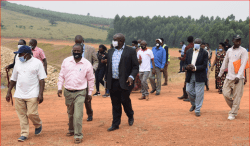
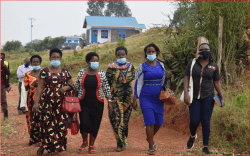
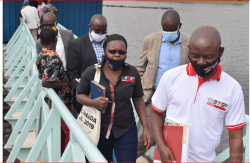
Stakeholders at the Mabira Dam Baraza
The Infrastructure Transparency Barazas is an approach adopted with modifications from the Office of the Prime Ministers accountability Barazas; to focus on promoting citizen engagement on infrastructure projects, create a platform for information sharing and identification of key issues affecting citizens on infrastructure projects at all levels of delivery.
The Ministry of Water and Environment welcomed the CoST Initiative to organize the Barazas on the two projects, they also provided oversight, mobilization, availability to respond to any concerns arising from the engagements, and to carry on with engagements thereafter. The Multi-Stakeholder Group of CoST Uganda attended the engagements and presented the assurance reports to the citizens emphasizing key issues for attention for all stakeholders.
The engagements revealed that the community appreciates the projects and that they were well-positioned to be in the respective communities. The engagements further revealed a need for increased citizen engagement in infrastructure delivery processes from preparation to completion and post-completion validating the finding from the previous assurance processes, as the driver to their full ownership, appreciation, and maintenance of infrastructure projects. The engagements which were backed up by two media engagements on Television and Radio West enabled the dissemination of the infrastructure transparency message beyond the project beneficiaries; in the coming month, we will be following up additional concerns raised during the Barazas such as an extension of the water facilities to more farmers in Mabira and Nyamihanga and strengthening ownership and access to information.
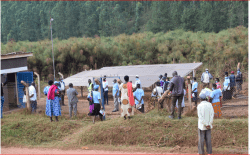
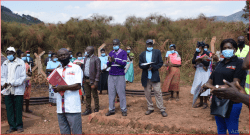
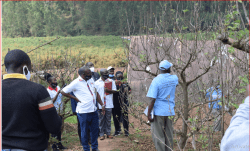
Stakeholders at the Nyamihanga Solar Powered Small Scale Irrigation Scheme
From the engagements; 168 people (80 Male, 88 Female) including citizens and leaders were scientifically (in the interest of COVID19) reached and more through social and traditional media; and these were introduced to CoST and the Assurance findings for joint action. We were able to establish a trust-building process between the citizens and their leaders, the Local Governments committed to monitor project usage and performance of the communities beyond the project hand over.
The engagements were a platform for citizens to receive information, the status of project implementation, and raise concerns. The engagements enabled increase awareness on the projects to the communities. For example; in Mabira Dam, stakeholders appreciated the project, despite the challenges of land acquisition the entity experienced due to a partial lack of effective citizen engagement approach to land acquisition. The citizens were on the other hand cautioned not to fail such projects aimed at bringing services to their community.
Whereas, the Mabira dam Baraza revealed that, the project had only benefited 2 pilot farmers, who were already doing well a few months after the construction works had been done, the community appreciated the very well-constructed project and the citizens asked the Ministry of Water and Environment to extend the water to more farmers. The Ministry committed to extending water for production to more than 200 farmers.
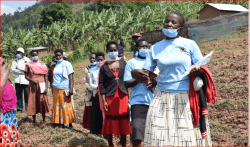
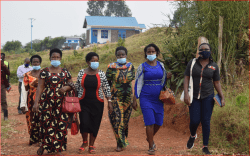
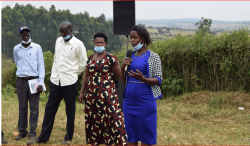
Women engaging during the Barazas
On their part, the citizens around Mabira dam had not maintained the project, the animal drinking troughs were dirty and the children were playing in them while grazing their animals, the community was tasked to ensure that these are cleaned from time to time. The Mabira dam community members also asked for more fish in the dam to supplement nutrition; the Mbarara district leadership tasked the local leadership to apply for more fish to be added into the dam.
Engagements in Mabira dam also revealed that the EISA or Environmental briefs for the project had not been disclosed to the district and thus, the district Environmental officer could not establish if these were approved and if the Ministry of Water and Environment had an Environmental Certificate, in addition, not disclosing these, deters the district from monitoring all activities within the community in regards to environmental protection. The Ministry agreed to submit all the documentation about the project in regards to Environmental protection and how the risks were addressed to the Ministry to inform the sustainability of the project and environmental protection.
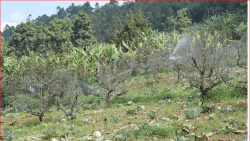
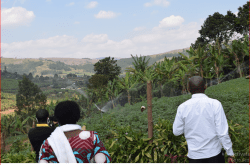

Some of the community gardens being supported by the irrigation scheme
In Nyamihanga Solar-powered small-scale irrigation scheme, farmers had benefited from the project, and they appreciated that their lives had improved as they could access fresh food during dry seasons, and were able to increase their savings/earnings, that had greatly enhanced their lives. In addition, the Baraza revealed that the community working with the Ministry had addressed the concern regarding maintenance and ownership of the project, there had been a case on the theft of the solar panels but the community pursued it and these were recovered. Ownership and maintenance had improved. In addition, the community had organized a maintenance fee for the project – and a guard had been deployed by the community to protect the solar panels. However, the community noted that it is a pilot project, the MWE ought to learn, the solar panels were not well placed and this is why they could easily be removed by thieves. Citizens also requested for extension of water for production to more communities, documentation of their experiences, and learning. The engagement revealed that many people had joined the farmers’ group but dropped out in the long run for unknown reasons. These were to be re-engaged.
Office of the Prime Minister appreciated the CoST approach, noting it is an issue-based citizen engagement approach; the OPM further noted that resulting from requests from CoST Uganda and other stakeholders on social accountability, the OPM was devising means to engage with CoST Uganda to further transparency in public infrastructure delivery. The CoST Barazas were well appreciated by all stakeholders and, many called on these to be rolled across all projects, using the CoST approach. Both engagements revealed that the districts had a role to play in educating the citizens on ownership, maintenance, and sustainability of the constructed infrastructure, and implored them to take center stage in doing this and adopting the agenda in their projects. The media was called on to document and share information about the projects from time. The line Ministry of Water and Environment also picked a lesson on the need to improve on the mobilization and organization of the community meetings.
